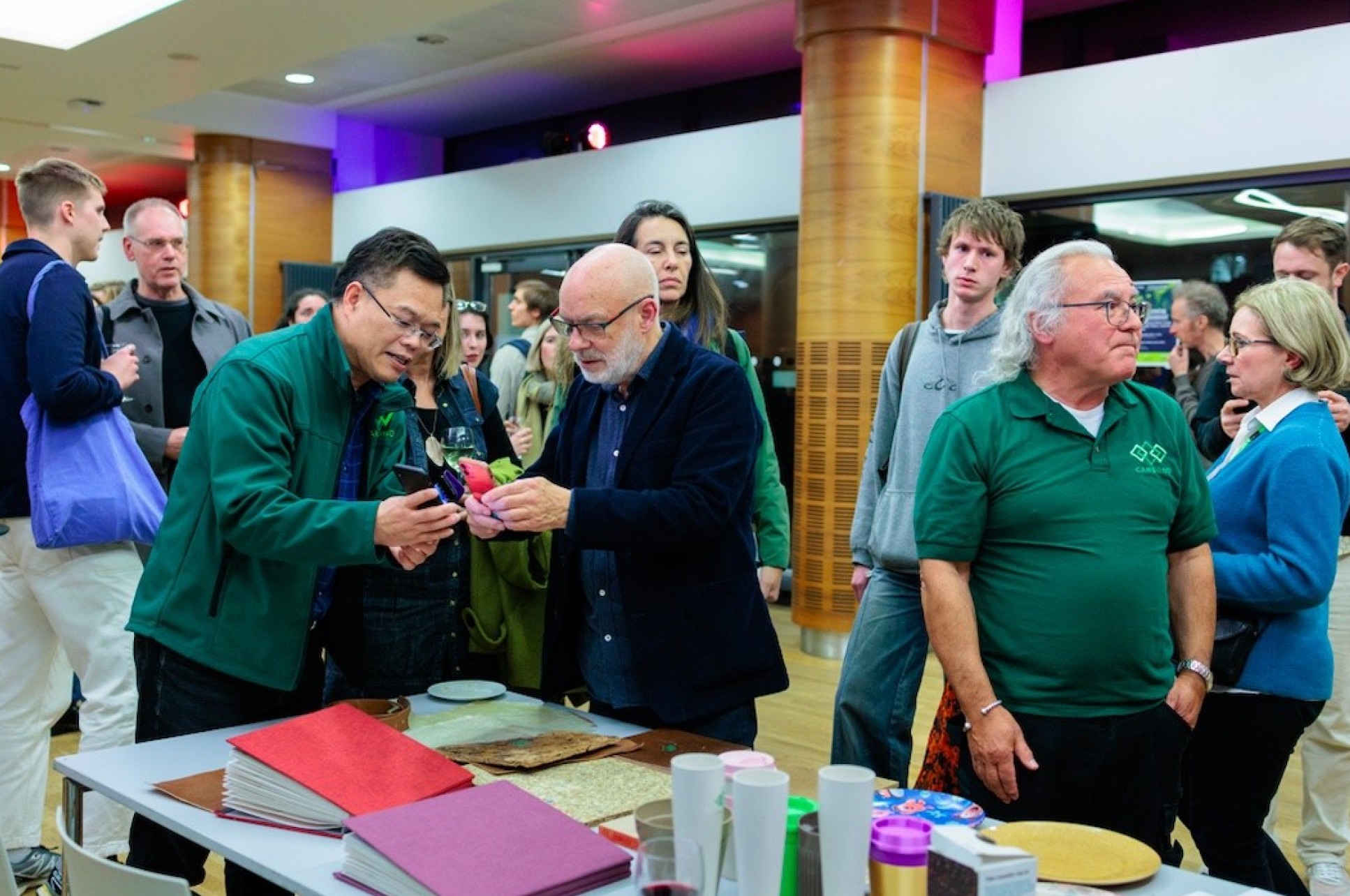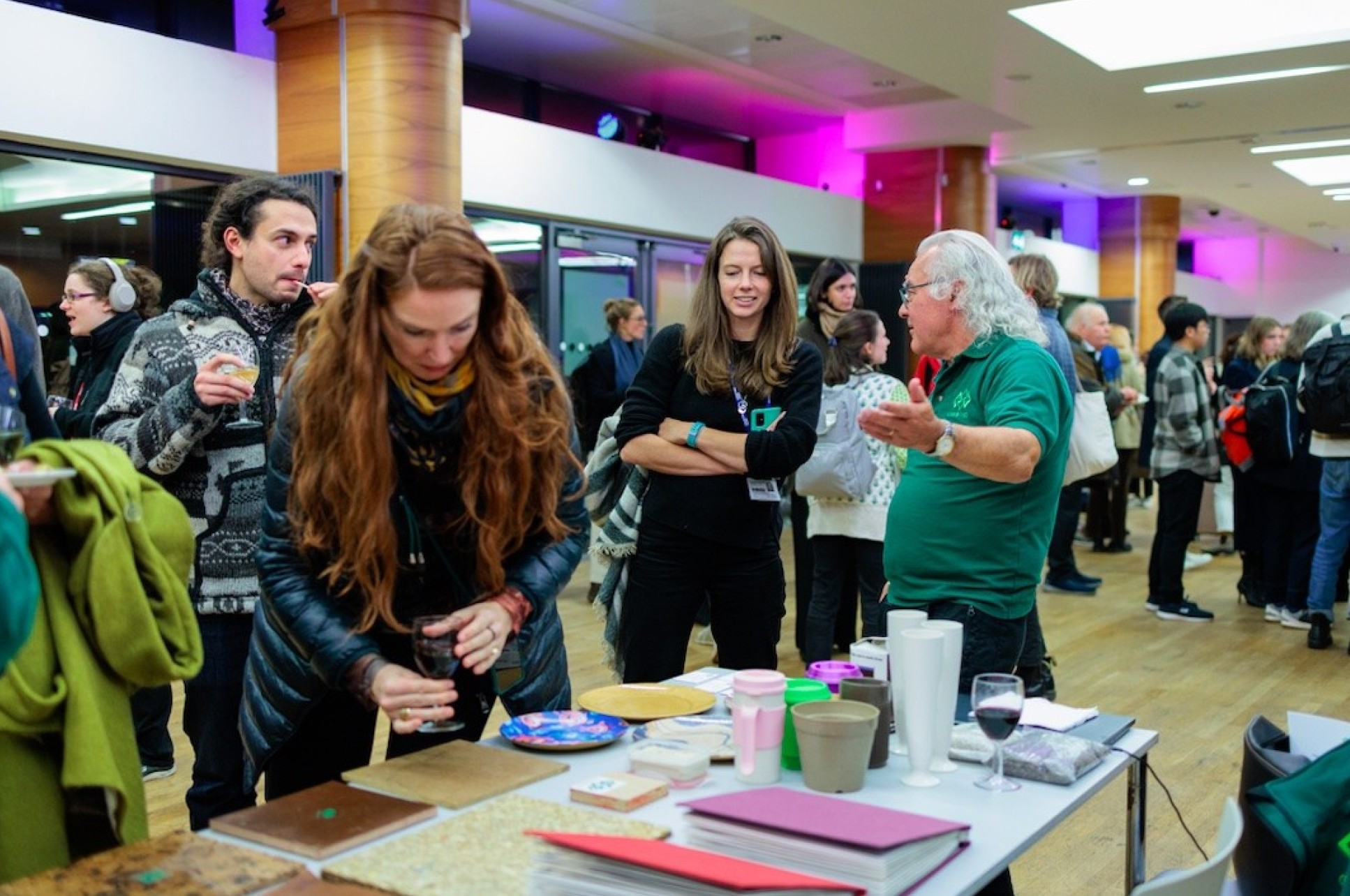From fashion to construction, Imperial start-ups lead on eco innovation

Imperial graduates are finding eco solutions to fast fashion
Imperial start-up businesses are leading the way in finding solutions to critical climate and environmental problems.
Inventions include construction materials made from food waste, an app that scours the internet for sustainable fashion alternatives, and a programme that encourages children to fix broken items instead of throwing them away.
The College has long encouraged its staff and students to use their skills and expertise in an entrepreneurial way, and as the climate crisis deepens, many are choosing to focus on these.
Students and staff exhibited their innovations last week at the Grantham Institute Annual Lecture, given by music legend and climate campaigner, Brian Eno.

Construction materials made from beer waste
Cambond turns waste from brewery and bioethanol plants into plant-based resin for the construction industry. The company estimates their invention could save 4.5m tonnes CO2 in the UK per year.
Professor Xiaobin Zhao, co-founder and CEO of Cambond, was inspired to develop the product using his knowledge of the impact of toxic chemicals on the human body, such as formaldehyde resin, used in the wood panel industry.
“Our innovation uses plant-based protein from algae and brewing by-products to bond wood fibres, chips, and veneer together, without using carcinogenic formaldehyde resin,” says Prof Zhoa. “This can have a huge impact on climate change as we can repurpose many wastes.”
Changing mature industries is hard work and requires the creative dynamite supplied by images, ideas, or feelings! Dr. Gareth W Roberts Co-founder of Cambond
Referencing Mr Eno’s lecture on using creativity to generate change, Dr. Gareth W Roberts, co-founder and business development manager of Cambond, added;
“Changing mature industries is hard work and requires the creative dynamite supplied by images, ideas, or feelings! Shared experiences lift us all and motivates whole populations to work together – this is the way to generate change.”
Teaching children how to repair and reduce waste
Team Repair is a team of five Imperial College engineers on a mission to encourage children to pursue STEM and fix the electronic waste crisis in the process.
The company teaches children science and technology by sending them electronic gadgets with carefully planned faults, which the children then fix, guided by an app.

Megan Hale, CEO and co-founder of Team Repair, says the engineers were inspired by their own childhoods, in which they all spent time taking gadgets apart.
“We want to inspire a new generation of sustainability-minded engineers to join the workforce,” says Ms Hale. “Our kits take a learning-through-play approach. We want this to encourage children to follow a STEM career whilst retaining that sustainability mindset.”
Redirecting spending to sustainable fashion
Three Imperial friends and graduates – Fatimah El-Rashid, Sille Eva Bertelsen, and Jenny Hu – who love fashion, but hate its environmental impact, have developed a Google Chrome extension to tackle the problem, following their joint Masters with the Royal College of Art.
SHADE integrates visual search into a user’s online shopping journey, so that they can click on any image and find similar styles from sustainable fashion brands.
Climate innovations should make people feel hopeful and help them recognise that they can create change Fatimah El-Rashid Co-founder of SHADE
“Fast fashion brands know consumers play a key role in determining the market, which is why a large chunk of their money goes into greenwashing,” says Ms El-Rashid. “Our vision is to disrupt the power dynamics between buyers and brands by playing fast fashion’s game in reverse,”
“SHADE diverts consumer attention and spending away from fast fashion and towards sustainable fashion. Climate innovations should make people feel hopeful and help them recognise that they can create change, which is why we built SHADE.”
More innovations
Materra has developed technology to grow cotton with minimal environmental impact and maximum yields in the face of climate change, and to help reduce the fashion industry’s footprint.
Agave Networks uses machine learning and image recognition algorithms to help manufacturing and construction businesses achieve net-zero waste by matching, relocating and tracking their excess materials with other organisations that could use them.
SAGES makes natural textile dyes from food waste as a commercial alternative to the harmful synthetic dyes the fashion industry currently uses.
Biodiverse Earth is an immersive experience that engages auditory and visual senses to take users on a journey through the rainforests of Costa Rica, highlighting the sheer biodiversity that exists in these forests and what happens to biodiversity when these areas are lost.
Music of the Earth is a collaboration between seven talented young composers from around the world, the public, and nature itself, including field recordings from cities to forests across eight countries. These are woven together into a four-movement symphony, as an emotional appeal to look after our beautiful planet.
Find out more
Student entrepreneurs and innovators can find support to develop their ideas from the Imperial Enterprise Lab.
Article text (excluding photos or graphics) © Imperial College London.
Photos and graphics subject to third party copyright used with permission or © Imperial College London.
Reporter
Jez Fredenburgh
The Grantham Institute for Climate Change